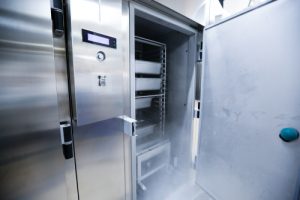 Tips for Extending the Life of your Commercial Refrigeration
Tips for Extending the Life of your Commercial Refrigeration
Commercial refrigeration equipment is a critical component in the foodservice industry, ensuring that food and beverages are kept fresh and safe for consumption. However, these appliances are prone to wear and tear and can break down without proper maintenance, leading to costly repairs and replacements. Therefore, it’s vital to take proactive steps to extend the life of your commercial refrigeration equipment. Here are some tips to help you get started:
1. Regular Cleaning
Regular cleaning is one of the most important steps you can take to extend the life of your commercial refrigeration equipment. A build-up of dust, dirt, and grime can cause the equipment to work harder, leading to increased energy consumption and excessive wear and tear. Therefore, it’s important to clean all parts of your refrigeration equipment, including the compressor, condenser, evaporator, and fans. Be sure to follow the manufacturer’s guidelines for cleaning these components, and clean them at least once a month.
2. Proper Placement
The placement of your commercial refrigeration equipment is crucial to its longevity. Make sure to place the equipment in an area that’s well-ventilated and away from heat sources like ovens, grills, and fryers. This helps to prevent the equipment from overworking and overheating, which can lead to breakdowns and other issues.
3. Regular Maintenance
Regular maintenance is essential to keeping your commercial refrigeration equipment running smoothly. A professional technician should inspect the equipment at least once a year, checking components like the compressor, condenser, evaporator, and fans for damage or wear. Additionally, they may recommend replacing components like gaskets, motors, or bulbs to ensure the equipment is running efficiently.
4. Temperature Control
Commercial refrigeration equipment is designed to maintain specific temperature ranges to ensure food safety and quality. However, these units can be subject to temperature fluctuations if placed near heat sources or in areas with significant temperature changes. Therefore, it’s important to keep the equipment in a temperature-controlled environment and monitor the temperature regularly to ensure it’s within the recommended range.
5. Regular Defrosting
If your commercial refrigeration equipment is a fridge or freezer, it will likely need to be defrosted regularly. Ice build-up can cause equipment to work harder and consume more energy. This can lead to breakdowns and other issues that will ultimately shorten the life of your equipment. Therefore, it’s important to defrost the equipment regularly according to the manufacturer’s instructions.
6. Use Correct Parts and Accessories
Using incorrect parts or accessories for your commercial refrigeration equipment can have negative consequences for the unit’s longevity and performance. If you need to replace any components, be sure to consult with the manufacturer or a professional technician to ensure you are using the correct parts. Similarly, be sure to only use accessories that are designed to work with your equipment, like shelving units or temperature probes.
7. Avoid Overloading
Overloading your commercial refrigeration equipment can lead to various issues, like temperature fluctuations or even equipment failure. Therefore, it’s important to avoid overloading your equipment, regularly check that the door seals are intact and clean. You may need an additional unit if you find that the current one does not hold enough refrigerated items.
Final Thoughts
Extending the life of your commercial refrigeration equipment requires regular maintenance, proper placement, temperature control, regular cleaning and defrosting, correct parts and accessories, and proper loading. By taking proactive steps to maintain your equipment, you’ll be able to avoid costly repairs and replacements, and ensure that your equipment remains a vital component of your foodservice operation for years to come.
